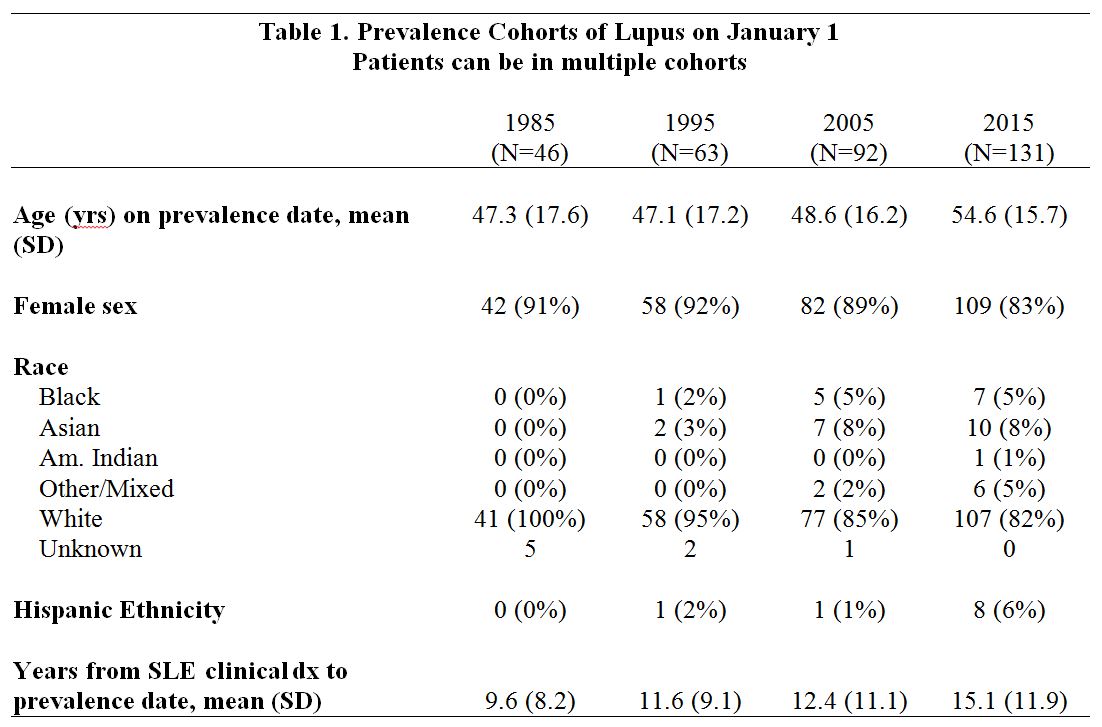Session Information
Date: Sunday, November 8, 2020
Title: Epidemiology & Public Health Poster III: Inflammatory Rheumatic Disease
Session Type: Poster Session C
Session Time: 9:00AM-11:00AM
Background/Purpose: Prevalence estimates of disease are important for public health planning. The available prevalence estimates of systemic lupus erythematosus (SLE) do not account for changes in exposures or survival that may contribute to prevalence changes over time. We aimed to estimate the prevalence of SLE over four decades.
Methods: Using established population-based research infrastructure that links the medical records of all the individuals in a geographically well-defined population, we identified all the prevalent SLE cases from 1976 through 2018 using diagnostic codes for cutaneous and systemic lupus and the following laboratory measures: anti-nuclear antibodies, anti-double stranded DNA, anti-Sm, anti-cardiolipin, anti-beta 2 glycoprotein 1antibodies, complement levels, coombs and lupus anticoagulant. Given that patients may migrate to our region after the diagnosis of SLE and might had longstanding disease, we classified prevalent cases if the treating rheumatologist or nephrologist had a statement confirming SLE diagnosis in the medical record.
We estimated point prevalence for January 1 of the years 1985, 1995, 2005 and 2015. Only individuals who were residents of our region for at least a year were included in the analysis.
Prevalence rates were age‐ and/or sex‐adjusted to the estimated 2010 white population of the US. To compute 95% confidence intervals for prevalence rates, it was assumed that the number of prevalent cases followed a Poisson distribution.
Results: We identified 46 prevalent cases in 1985, 63 in 1995, 92 in 2005 and 131 in 2015. As detailed in Table 1 the mean age of prevalent cases over four decades increased from 47.3 years in 1985 to 54.6 years in 2015. Race was reported consistently from 1995 onwards, the proportion of whites decreased from 95% to 82% while the proportion of males increased from 9% to 17%.
Overall, from 1985 to 2015 the prevalence increased by 64%; 55.2 per 100,000 in 1985 to 90.8 per 100,000 in 2015. In females the prevalence increased by 44% from 100.6 to 144.9 per 100,000, while in males it increased 360% from 7.3 to 33.6 per 100,000 (Table 2).
Conclusion: Results from the study show a dramatic increase in prevalence of SLE in the last four decades. These trends likely reflect improvements in survival. The biggest gains have been on the male SLE patients. It is unclear if other factors, such as an increase in SLE incidence or changes in the racial composition of the population are influencing these epidemiologic changes.
 Table 1. Prevalence Cohorts of Lupus Demographic Characteristics
Table 1. Prevalence Cohorts of Lupus Demographic Characteristics
 Table 2 Prevalence rates of systemic lupus erythematosus over four decades
Table 2 Prevalence rates of systemic lupus erythematosus over four decades
To cite this abstract in AMA style:
Duarte-Garcia A, Hocaoglu M, Osei-Onomah S, Dabit J, Achenbach S, Crowson C. Prevalence Estimates for Systemic Lupus Erythematosus over Four Decades [abstract]. Arthritis Rheumatol. 2020; 72 (suppl 10). https://acrabstracts.org/abstract/prevalence-estimates-for-systemic-lupus-erythematosus-over-four-decades/. Accessed .« Back to ACR Convergence 2020
ACR Meeting Abstracts - https://acrabstracts.org/abstract/prevalence-estimates-for-systemic-lupus-erythematosus-over-four-decades/
